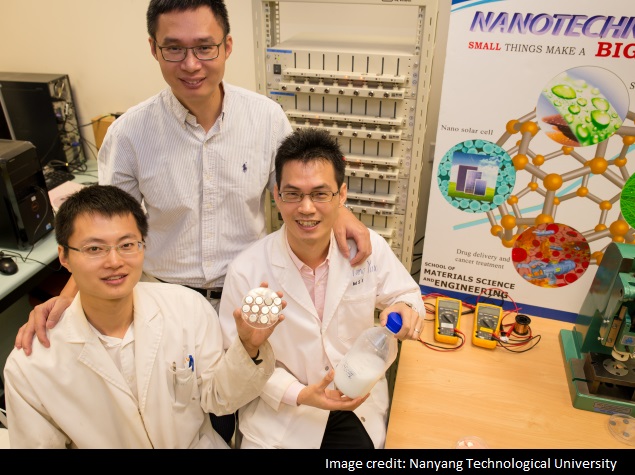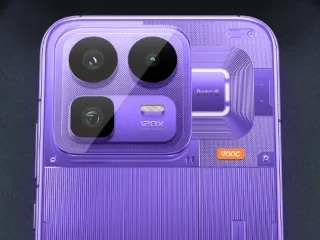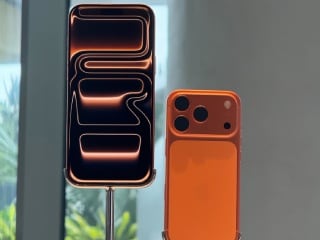- Home
- Science
- Science News
- New Ultra Fast Batteries Recharge in Just 2 Minutes
New Ultra-Fast Batteries Recharge in Just 2 Minutes

The breakthrough has a wide-ranging impact on all industries, especially for electric vehicles, where consumers are put off by the long recharge times and its limited battery life, researchers said.
With this new technology by Nanyang Technology University (NTU) in Singapore, drivers of electric vehicles could save tens of thousands on battery replacement costs and can recharge their cars in just a matter of minutes.
Commonly used in mobile phones, tablets, and in electric vehicles, rechargeable lithium-ion batteries usually last about 500 recharge cycles.
This is equivalent to two to three years of typical use, with each cycle taking about two hours for the battery to be fully charged.
In the new battery, the traditional graphite used for the anode (negative pole) in lithium-ion batteries is replaced with a new gel material made from titanium dioxide.
Titanium dioxide is an abundant, cheap and safe material found in soil. It is commonly used as a food additive or in sunscreen lotions to absorb harmful ultraviolet rays.
Naturally found in spherical shape, the team has found a way to transform the titanium dioxide into tiny nanotubes, which is a thousand times thinner than the diameter of a human hair. This speeds up the chemical reactions taking place in the new battery, allowing for superfast charging.
Associate Professor Chen Xiaodong from NTU's School of Materials Science and Engineering and his team will be applying for a Proof-of Concept grant to build a large-scale battery prototype.
Chen expects that the new generation of fast-charging batteries will hit the market in the next two years.
It also has the potential to be a key solution in overcoming longstanding power issues related to electro-mobility, researchers said.
"Electric cars will be able to increase their range dramatically, with just five minutes of charging, which is on par with the time needed to pump petrol for current cars," added Chen.
"Equally important, we can now drastically cut down the toxic waste generated by disposed batteries, since our batteries last ten times longer than the current generation of lithium-ion batteries," said Chen.
The 10,000-cycle life of the new battery also means that drivers of electric vehicles would save on the cost of battery replacements, which could cost over $5,000 (roughly Rs. 3.1 lakhs) each.
The research was published in the journal Advanced Materials.
Catch the latest from the Consumer Electronics Show on Gadgets 360, at our CES 2026 hub.
Related Stories
- Samsung Galaxy Unpacked 2025
- ChatGPT
- Redmi Note 14 Pro+
- iPhone 16
- Apple Vision Pro
- Oneplus 12
- OnePlus Nord CE 3 Lite 5G
- iPhone 13
- Xiaomi 14 Pro
- Oppo Find N3
- Tecno Spark Go (2023)
- Realme V30
- Best Phones Under 25000
- Samsung Galaxy S24 Series
- Cryptocurrency
- iQoo 12
- Samsung Galaxy S24 Ultra
- Giottus
- Samsung Galaxy Z Flip 5
- Apple 'Scary Fast'
- Housefull 5
- GoPro Hero 12 Black Review
- Invincible Season 2
- JioGlass
- HD Ready TV
- Laptop Under 50000
- Smartwatch Under 10000
- Latest Mobile Phones
- Compare Phones
- Vivo Y500i
- OnePlus Turbo 6V
- OnePlus Turbo 6
- Itel Zeno 20 Max
- OPPO Reno 15 Pro Mini 5G
- Poco M8 Pro 5G
- Motorola Signature
- Vivo Y50e 5G
- Lenovo Yoga Slim 7x (2025)
- Lenovo Yoga Slim 7a
- Realme Pad 3
- OPPO Pad Air 5
- Xiaomi Watch 5
- Huawei Watch 10th Anniversary Edition
- Acerpure Nitro Z Series 100-inch QLED TV
- Samsung 43 Inch LED Ultra HD (4K) Smart TV (UA43UE81AFULXL)
- Asus ROG Ally
- Nintendo Switch Lite
- Haier 1.6 Ton 5 Star Inverter Split AC (HSU19G-MZAID5BN-INV)
- Haier 1.6 Ton 5 Star Inverter Split AC (HSU19G-MZAIM5BN-INV)

















